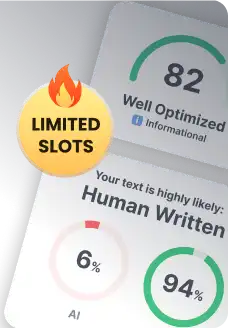You’ve finally cracked the code! Your website is ranking on the first page of Google. But hold on—why isn’t your traffic skyrocketing? The answer might surprise you. It’s not enough to just rank—you need to entice users to actually click on your link. This is where the magic of SEO titles comes in. A compelling title can be the difference between a click and a complete ignore. Ready to transform your SEO titles into click magnets?
Key Takeaways
- Crafting effective SEO titles is crucial for improving search engine rankings and attracting clicks. Focus on including primary keywords naturally.
- Titles are not direct ranking factors, but they influence click-through rates, which can impact overall SEO performance.
- Use actionable language and emotional triggers in your titles to engage readers and encourage them to click.
- Follow best practices by keeping titles concise, typically under 60 characters, to ensure they display fully in search results.
- Be aware of Google’s modifications to titles, as these changes can affect how your content appears in search results. Regularly review and adjust your titles accordingly.
- Continuously test and refine your SEO titles based on performance data to better align with audience preferences and search behavior.
What Are SEO Titles?
SEO titles are the HTML title tags that appear in search engine results. These titles act as your first impression on potential visitors, similar to the headline of a newspaper—short, punchy, and informative. They are crucial because they help Google and other search engines understand the content of your page, which directly affects how your site ranks in search results.
Moreover, to guide search engines, SEO titles are what users see when browsing through search results. A well-crafted title not only attracts attention but also conveys the essence of your content, increasing the likelihood of clicks.
Purpose of SEO Titles
The primary purpose of an SEO title is to attract clicks by addressing users’ search intent, ultimately improving your website’s click-through rate (CTR) and driving relevant traffic. A well-crafted SEO title not only draws attention but also contributes to better SEO performance by helping search engines index and rank your pages accurately.
To craft an effective SEO title, keep these tips in mind:
- Keep it under 60 characters.
- Include relevant keywords naturally.
- Make it compelling with action words or questions.
- Ensure it’s unique for each page.
Are Titles Ranking Factors?
via GIPHY
Influence on Search Rankings
SEO titles significantly influence search rankings by impacting click-through rates (CTR), a key ranking factor. A compelling title encourages users to click, increasing traffic and signaling to search engines that your content is relevant. Incorporating keywords within SEO titles enhances this effect, as search engines use them to assess content relevance and match user queries with suitable results.
While titles are important, they are just one of many factors considered by search engines, alongside content quality, backlinks, and user engagement. However, overlooking the significance of titles would be a mistake, as they set the stage for your content’s performance.
Importance Beyond Rankings
Titles also serve as the first impression of your content, attracting and engaging audiences before they even read your article. A captivating title not only draws clicks but also fosters meaningful interactions.
Additionally, effective titles contribute to your brand identity and authority, establishing your brand as a trustworthy source within your niche.
Want to try SurgeGraph for free?

Generate 20 documents

SEO tools (Auto Optimizer, Internal Linking, and more)

No credit card required
How to Write Effective SEO Titles
1. Use of Target Keywords
Start with your target keyword at the beginning of the title to maximize its impact, as search engines and users focus on the first few words. Integrate keywords naturally to maintain relevance and readability. Use function words like “and,” “or,” and “but” to enhance flow and engagement.
2. Optimal Title Length
Aim for a concise title of around 50-60 characters to ensure visibility in search results without being cut off. Every word should add meaning or entice clicks. Consider what would catch your attention if you were searching.
3. Craft Engaging Titles
Your titles should spark curiosity or provide solutions. Use active language that compels action, such as “discover,” “learn,” or “explore.” Posing questions or including numbers, like “5 Tips to Boost SEO,” makes titles more appealing. Highlight what makes your content unique.
4. Incorporate Brand Name or Location
Including your brand name or location enhances recognition and relevance. For well-known brands, this adds credibility, while for local businesses, mentioning a location improves search visibility. Strategically place these elements to enhance the title’s message and attract your target audience.
Best Practices for SEO Title Optimization
Align with Search Intent
Understanding search intent is critical for effective SEO title tags. It refers to the underlying reason behind a user’s query—whether they’re looking to buy, seeking information, or comparing options.
To create effective titles, identify keywords that align with these intents and naturally integrate them into your title tags. Incorporating brand names can also enhance visibility and credibility, distinguishing you from generic results.
Consider the User’s Journey
Users do not follow a linear path; they may explore multiple pages before making a decision. To cater to their journey, tailor your titles to reflect their stage. Use phrases like “Beginner’s Guide” for early research stages, or “Buy Now” for ready-to-convert users.
Additionally, ensure related pages have titles that logically connect, creating a seamless navigation experience.
Regularly Update Titles
Regularly updating titles is crucial for maintaining relevance and traffic. Analyze performance data to identify underperforming titles and adjust them using current keywords that reflect evolving search patterns. Also, consider incorporating seasonal trends or new industry developments to capture interest and improve click-through rates.
Impact of Google’s Modifications
Want to try SurgeGraph for free?

Generate 20 documents

SEO tools (Auto Optimizer, Internal Linking, and more)

No credit card required
Understanding Google’s Changes
Google’s approach to SEO titles has evolved significantly, often altering specified titles based on page content to ensure relevance and accuracy. While these modifications can occur, SEO titles still play a vital role in keyword ranking and affect your page’s positioning in search results.
Therefore, it’s essential to craft informative titles closely aligned with your content. Additionally, be prepared for variations in how brand names appear in search snippets, as Google may shorten or rephrase them, impacting visibility.
Adapting to Algorithm Updates
Adapting to Google’s algorithm updates requires both awareness and proactive preparation. Stay informed about changes through credible sources like Google’s official blog or analyses from industry experts.
Refine your SEO strategy by focusing on quality content that aligns with user intent and accurately represents your titles while incorporating primary keywords.
Conduct regular audits using tools like Google Search Console to monitor your website’s performance and identify patterns, allowing you to make data-driven decisions to optimize your SEO titles.
Frequently Asked Questions
What is the difference between an SEO title and a site title?
An SEO title is crafted for search engines to improve visibility and rankings. A site title reflects your brand or site’s identity. Both are crucial, but they serve different purposes.
How to create an SEO-optimized title?
Use keywords naturally, keep it under 60 characters, and make it compelling. Include your brand name if possible. This attracts clicks and boosts rankings.
How to choose an SEO title?
Research relevant keywords and understand user intent. Craft a concise, engaging title that matches what users are searching for. Test different variations for effectiveness.
Are titles ranking factors?
Yes, titles are vital ranking factors. They help search engines understand content relevance and influence click-through rates, impacting overall SEO performance.
What is the impact of Google’s modifications on titles?
Google may rewrite titles to better match query intent. This can affect click-through rates. It’s essential to align your titles closely with user expectations to minimize changes.





